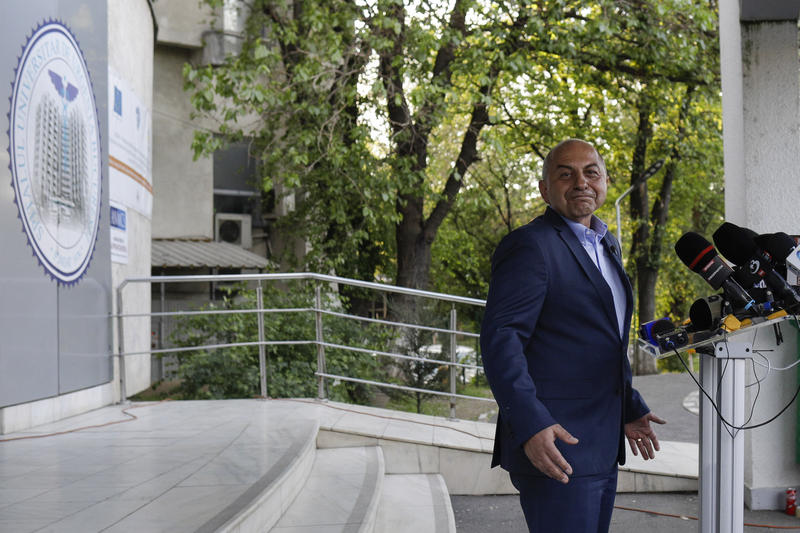One newspaper on Tuesday digs deeper into a story of weddings and criminal deals involving Economy minister Codrut Seres. A deal between Romanian mogul Ion Tiriac and Mercedes for the distribution of cars in the country is heralded across the media.
Today’s papers see the main opposition party in trouble following the departure of an influential witness - but so seems the governing coalition as well. And many dailies focus on Romania’s social and economic relations with its neighbors and with Europe.
Evenimentul Zilei tells the story of the man who became the godfather of Economy minister Codrut Seres. Millionaire businessman Sebastian Ghita is currently under National Anti-Corruption Department scrutiny for a 1 million euro damage to the district council of the Prahova county, north of Bucharest.
Ghita, a businessman known for his many contracts with the Economy Ministry in Bucharest is investigated for bribery in a case focused on the partnership between his IT company Asesoft and the Prahova council.
Evenimentul Zilei also reports that after HVB Bank and Allianz, another big Western company will enter a partnership with Romanian businessman Ion Tiriac.
The car dealing group owned by Tiriac announced yesterday that it signed a contract with DaimlerChrysler to establish a joint venture in Romania for the distribution and promotion of Mercedes-Benz, Smart, Chrysler, Jeep, Dodge and Fuso cars in the country.
The paper notes that Tiriac has become the partner of other Western groups since 2000, when he sold 51% of its insurance company to Allianz, and than merged his bank with the local branch of HVB. He also holds 15% of Metro Cash&Carry, the Western retailer that is one of the most successful companies in Romania.
Cotidianul underlines that the partnership with DaimlerChrysler will become effective on January 1 2007 and will allow the Romanian subsidiary of the US-German group to take over import, marketing and sales activities for five brands from the Romanian business.
On the political front, Evenimentul Zilei reports that the current leadership of the Social Democratic Party (PSD), the main opposition group in Romania, managed to get rid of a controversial member but could not force the same with another.
Ex-Economy minister Dan Ioan Popescu resigned from the party yesterday, blaming party leader Mircea Geoana’s policies. But Geoana’s PSD could not bring down another ex-minister, Miron Mitrea, who remains deputy-speaker of the House of deputies despite the lack of support within his own group.
Cotidianul notes that DI Popescu’s resignation came as a surprise and that it included five reasons, including that the PSD “stopped being a democratic party”.
Gandul opts to focus on the problems of the current governing coalition and claims that the Democratic Party - PD, a senior member of the alliance, waits for President Basescu to suspend Defense minister Teodor Atanasiu, a member of the fellow Liberal Party, in order to claim his seat for a minister of its own.
And Romania libera debates a new confrontation within the governing coalition, this time on the Constitution.
While Liberals - who now control the seat of prime minister - opt for a Constitution strengthening the power of the Government, the Democrats - who boosted President Traian Basescu to power - favor a presidential republic.
Basescu is also eyed by Adevarul, who digs out an older story and interviews a journalist claiming that the current president destroyed his secret police file in the 1989 revolution.
Adevarul then turns its focus on Russia, quoting Moscow’s Ambassador to Romania Aleksandr Churilin as saying that just like his country listens carefully to what is said in Bucharest, Bucharest should listen carefully to what Moscow says, to hearken to its proposals and ideas.
Which, in Adevarul terms, means “Russia wants Bucharest to listen to Moscow”.
The relations of Romania with other countries and international structures are also tackled with in Cotidianul, which publishes a long analysis of the small rivalries between Romania and Bulgaria, which become significant when it comes to their span and variety.
“The small war” extends from football to polenta to pickles to Dracula, the newspaper reports in a feature that deals with how the WWII enmity turned into tourism and EU accession competition.
Gandul takes a different approach to international relations and quotes an ITV News report, cited by The Scotsman, according to which Romanian children may be bought for 5,000 pounds.
And the same newspaper notes that Hungarians are ready to re-start the shopping tourism to Romania, considering the economic austerity moves adopted by the Gyurcsany government in Budapest and the wave of price rises expected in Hungary.



















